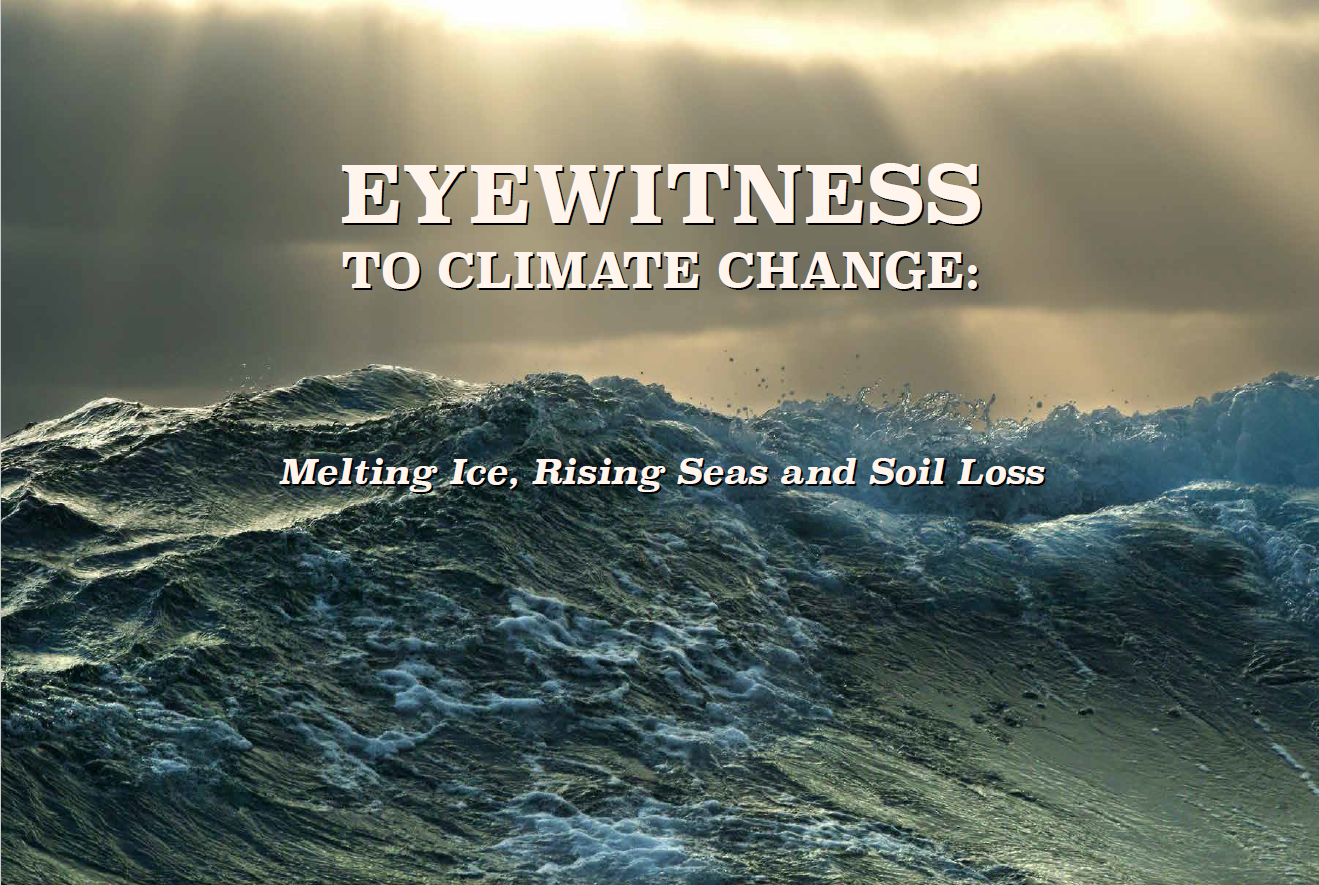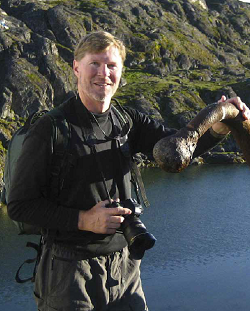

Eyewitness to Climate Change - Famed Arctic Explorer in Fairfield
The Southeast Iowa Sierra Club and Humanities Iowa are bringing a very special speaker to Fairfield’s Sondheim Theatre on Sunday, February 24 at 2:30 pm (free and open to all). David Thoreson, extraordinary arctic sailor, photographer, and member of the Explorers Club, is the first American to transit by sailboat the infamous Northwest Passage in both directions. Thoreson was also the documentary photographer and filmmaker on a 13-month circumnavigation of the North and South American continents.
Thoreson’s presentation is a stunning multi-media event using photography, humor, and storytelling drawn from often-harrowing experiences in some of the most remote regions of the planet, gleaned from 65,000 miles of sailing. Born and raised in land-locked Iowa, Thoreson became – quite unpredictably – one of the great sailor-explorers of our time.
The presentation draws particularly on Thoreson’s unique experiences sailing amidst the northern ice. It illustrates the dramatic impacts of global warming, based on time spent in regions of our world that are changing most rapidly and most radically. Thoreson highlights other affronts to planetary life, including rising seas, ocean acidification, the onslaught of plastics, and soil loss here in the Iowa.
Thoreson will give a book talk and entertain questions at Revelations Café on Saturday, Feb 23, 1:30-3:00, where signed copies of his photo journal, Over the Horizon: Exploring the Edges of a Changing Planet, will be available.
In addition, “Dinner with David Thoreson” will be held Saturday evening, Feb 23 at Revelations Café. Social hour begins at 6:30, dinner at 7:00 pm. $15/person. Dinner reservations required by Wednesday, Feb 20 at 641 472-6733 or joanallen.revs@gmail.com.
All are invited to meet David, socialize, and network with other community members concerned with water, soil and climate issues
http://www.fairfieldacc.com/events/david-thoreson-eyewitness-to-climate-change-2019-02-24.html seiowasierraclub@gmail.com

A powerful new film about the people and communities leading the way towards a renewable energy future.
Saturday, March 17 at 2:00 and 7:30 pm
The Orpheum Theater, Fairfield
Free Admission—Donations Welcome!
Cover Crops: Farmers, Sierra Club Find Common Ground
Amidst Divisive Water Quality Controversy
Sierra Club of Southeast Iowa
2331 Seven Hills Road • Fairfield, Iowa 52556
641-451-5000
For Immediate Release
Contact: Joseph Boxerman
Director of Public Relations
641-451-5000
seiowasierraclub@gmail.com
Farmers, Sierra Club Work Together to Clean Up Iowa Waterways
Cover Cropping to Improve Yields, Reduce Nutrient Run-Off
Cost effective, Win/Win Solution
IOWA WATER QUALITY INITIATIVE
FREE PUBLIC TALK - Kalona Public Library
Tuesday, May 16th at 7:30pm.
Sponsored by Sierra Club of Southeast Iowa, Sierra Club of Iowa City
Farmer Steve Berger and Farmer/Soil Scientist Francis Thicke to Discuss and Moderate Community Forum on Cover Crops and
Iowa’s Nutrient Reduction Strategy (INRS)
Kalona, Iowa - Stark division characterizes today's American political landscape. In Iowawater pollution is a contentious issue that often pits farmers against environmentalists, and even against an urban water works agency. Two years ago the Des Moines Iowa Water Works sought judicial action to force Iowa farmers to pay to clean up the city's drinking water. The utility sued rural drainage districts that route farm runoff into the polluted Raccoon River, one of Des Moines' main sources of drinking water. That action fired reverberating shock waves through Midwest communities.
Iowans Find Common Ground
But, in what may be a sign of progress, common ground is gradually surfacing in this historically divisive issue. Farmers and Sierra Club members are exploring a cost effective, win/win solution to improve Iowa's depleted soil and reverse the damage to Iowa's polluted waterways: cover cropping. "Cover crops, properly applied, have worked for me to preserve my topsoil and, in the process, reduce nutrient run-off", says Kalona area farmer Steve Berger.
The Sierra Club of Southeast Iowa is running a series of local talks on the issue. In the second of the series Berger and farmer/soil scientist Francis Thicke will be featured speakers and will also help moderate the community discussion on how to understand and use cover crops to benefit both crop yield and reduced run-off. The regional nonprofit organization Iowa Valley RC&D is also supporting the event. "Conversations like these are so important," says Iowa Valley RC&D Executive Director Jessica Rilling, "when stakeholders from urban and rural areas work together on solutions, the solutions are more strategic, have broader ownership, and are more likely to be successfully implemented."
A free presentation at the Kalona Public Library (510 C Ave, Kalona) will be held on Tuesday, May 16th at 7:30pm. Farmers and community members from all backgrounds are encouraged to attend. Issues regarding water pollution will be discussed. Audience questions and participation is welcomed.
Cover Cropping to Strengthen Soil, Improve Profitably, Reduce Nutrient Run-Off
Area farmer Steve Berger will describe his successful experience with cover crops.
His talk will cover a range of practical topics. Farmers who would like to try cover cropping or have tried it but it didn’t work out as planned, will benefit from this information. Berger will talk about his education over time with cover crops. He will explain what he’s tried that works and what didn’t work; what works in wet years, in dry years, and how his soil has benefited. Questions and discussion from participants are encouraged.
Steve is well known across Iowa for his experience and leadership with cover cropping and no-till. He has a 2,200 acre farm near Wellman in Washington County where he has been using cover crops and no-till for many years.
SE Iowa farmer Francis Thicke, PhD, who is also a soil scientist, will present a brief overview of INRS - Iowa’s Nutrient Reduction Strategy. He will review parts of it that are often misunderstood.
Berger believes that no-till farming and cover crops go hand in hand. Both are a part of conservation practices the state is urging farmers to adopt to help improve Iowa’s water quality.
For More Information Contact: Joseph Boxerman, Director of Public Relations, 641-451-5000,
Sierra Club of SE Iowa
BACKGROUNDER
Cleaning Up Iowa Waterways
The Iowa Department of Natural Resources, the Iowa Department of Agriculture and Land Stewardship, and Iowa State University created the Iowa Nutrient Reduction Strategy (INRS) as a partnership. Its goal is to reduce the amount of nutrients – particularly nitrogen and phosphorus – entering Iowa’s water bodies and the Gulf of Mexico.
Once in the Gulf, these nutrients, which are required for plant and crop growth, trigger algae blooms that choke off oxygen in water and make it difficult, if not impossible, for marine life to survive. This has potentially devastating effects on the seafood industry – 40 percent of the nation's seafood comes from the Gulf. The Gulf “dead zone” has been growing and this results in an estimated $82 million in losses by the seafood and tourism industries.
In Iowa, 736 of the 1,316 waterways assessed by the Iowa Department of Natural Resources were determined to be impaired as of 2015. An impaired waterway is one that does not meet at least one of the Clean Water Act’s quality standards and is deemed too polluted for its designated use. For Iowa’s streams, nitrate and bacterial and biological impairments are common, altering habitats and oxygen levels of the water bodies. Phosphorus, turbidity (clouded water) and algae are common impairments in Iowa’s lakes (Iowa Department of Natural Resources, 2015).
According to the Science Assessment of Iowa’s Nutrient Reduction Strategy, over 90 percent of nitrogen pollution in the state’s waterways comes from agriculture. Urban areas have regulations for pollution, whereas water quality management for agriculture is unregulated and voluntary. Thicke believes that awareness of the issues will help create change, and that the effectiveness of a voluntary strategy for agriculture should be debated. Water quality in Iowa does not seem to be improving, according to the most recent report provided by the Iowa DNR. A voluntary approach may not be enough if farmers do not choose to collectively participate.
Speaker Bio-Sketches
Steve Berger, No-till Farmer
https://www.iowalearningfarms.org/page/steve-berger
Steve Berger is well known in southeast Iowa for his history of no-till and he is fast becoming a household name when it comes to cover crops. In 2007, he planted 1,000 acres of rye on his farm near Wellman in Washington County. He also has a hog finishing operation.
He credits his dad with the beginning of their conservation efforts, who started no-tilling 30 years ago, when Steve was a young teen. He jokes, “That would make me a no-till baby.” He says he is more comfortable with no-till than he would be working with a disc or plow.
Steve has a passion for conservation farming. He likes to lead by example. “I’m really against mandates. So I think the best solution is to try to get it done ourselves. I felt the most successful when a neighbor called me up and said, ‘Things look good here; what are you doing here?’ I’m more than glad to help them out.”
“We have to make sure whatever we do in our operation is going to sustain agriculture for many years to come. There are a lot of farmers on my farm ahead of me and I sure hope there will be some that follow me. But it’s up to us to try to leave the farm better than it was when we got it.”
Steve and his wife, Julie, are involved in their local church and Rotary Club. They serve on the Rotary-District 6000 Youth Exchange Committee which sponsors 30 to 40 exchange students annually. He is also a member of the Washington County Pork Producers. Steve holds a B.S. from Iowa State University.
Francis Thicke, PhD, Diary Farmer/Soil Scientist
https://www.ams.usda.gov/rules-regulations/organic/nosb/current-members/francis-thicke
Owner, Radiance Dairy Farm, Fairfield, IA
Member, National Organic Standards Board (NOSB) from January, 2013 – January, 2018
A farmer for over 30 years, Dr. Thicke operates an 80-cow, certified organic dairy in Fairfield, Iowa, producing milk, cream, yogurt, and cheese for sale at local grocery stores and restaurants.
Previously, Dr. Thicke served as a National Program Leader for Soil Science at the USDA Extension Service, where he worked extensively in water quality and sustainable agriculture programs. He was named the 2012 Farmer of the Year by the Midwest Organic and Sustainable Education Service.
As a scientist specializing in soil fertility, Dr. Thicke also has a solid working knowledge of agricultural and food chemistry. Given the NOSB’s role in vetting substances to be used in the production and processing of organic foods, his unique blend of on-farm and scientific expertise will add significant depth to the NOSB.
Francis earned a Ph.D. in Agronomy/Soil Fertility from the University of Illinois in 1988, a Master’s degree in Soil Science from the University of Minnesota in 1984 and a Bachelor’s degree in Music and Philosophy from Winona State College in 1972.